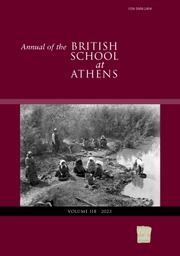No CrossRef data available.
Article contents
A Minoan shaft-grave on the slopes opposite the Temple Tomb (Knossos Survey 152)
Published online by Cambridge University Press: 20 December 2013
Extract
The slopes of Ailias beyond the Kairatos stream to the east of the Minoan city have so far largely escaped the intensive vineyard cultivation that has swallowed so much of the land round Knossos. Isolated tombs and cemeteries (e.g. Knossos Survey 58, 95, 96) have been explored on these slopes due east and north of the Palace of Minos, but virtually nothing has yet been recorded from the area to the south. Minoan sherds on the surface of the fields opposite the Temple Tomb, however, suggest the possible existence of tombs in this area.
In 1951 on the lower slopes here on land belonging to Evstratios Sarikis a hole was dug to plant an olive tree, leading to the removal of some large stones and disclosing a right-angled cut in the rock, which was noticed by the sharp and practised eye of Spiro Vasilakis. Two years later with the permission of Dr. Platon, Ephor of Antiquities for Crete, I cleared the cutting during the course of the School's excavations in the Middle Minoan cemetery higher on the slopes of Ailias to the north. The cutting, which was rectangular, measuring 1·90 × 1·40 at the bottom, and 1·20 deep from the surface of the rock at the highest point in the south-east corner, is perhaps best explained as a plundered Minoan shaft-grave, although no sign of a burial or of any grave goods was found in it. It was entirely filled below the level of the rock surface with large blocks of the local limestone, several of them worked, and including a slab which might have served as the covering for a shaft-grave, and a pyramid with a square socket in the top (A on the plan, Fig. I ), evidently the base for some ritual object like a double axe.
- Type
- Articles
- Information
- Copyright
- Copyright © The Council, British School at Athens 1959
References
1 In Palace: (1) Long Corridor of the Magazines (PM i. 437, fig. 314); (2) Queen's Megaron (iii. 369); (3) South-east Quarter near Shrine of Double Axes (ii. 334). Outside Palace: (4) South House (ii. 386); (5) South-east House (i. 427, fig. 307); (6) Little Palace (ii. 527); (7) Caravanserai (ii. 139).


